Readers cannot have forgotten the BBC’s dismal coverage of the explosion at al Ahli hospital in the Gaza Strip on the evening of October 17th 2023 and its subsequent attempts to do damage control following extensive criticism:
WHY BBC REPORTING ON THE AL AHLI HOSPITAL INCIDENT SHOULD NOT SURPRISE
BBC EFFORTS TO DAMP DOWN CRITICISM DO NOT ADDRESS THE REAL ISSUES
As documented here, the BBC’s rather costly fact-checking and anti-disinformation department, BBC Verify, produced three items relating to that incident, all of which promoted the notion that the circumstances of the incident are “still contested” and that there are “competing claims and counterclaims” regarding the cause of the explosion: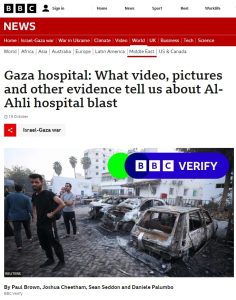
REVIEWING BBC VERIFY REPORTING ON THE AL AHLI HOSPITAL INCIDENT
In November, the BBC’s Executive Complaints Unit used the content produced by BBC Verify to reject complaints relating to its coverage of that incident:
BBC RESPONSES TO CRITICISM OF COVERAGE OF THE AL AHLI EXPLOSION – PART TWO
“The complaints also referred to a BBC News push alert and a post on the BBC Breaking News X (Twitter) account at around 6.25pm and 6.51pm respectively on the same evening with almost identical wording. The X post said: “Hundreds feared dead or injured in Israeli air strike on hospital in Gaza, Palestinian official says.”
The ECU noted that the BBC “cannot yet establish as fact who was responsible for the blast”, citing BBC Verify reporting. Other sources, including the complainants and the Associated Press, believe the explosion was “likely caused by a rocket launched from within Gaza that misfired”.
It said it therefore had “no grounds for concluding” the posts were inaccurate.”
Those BBC Twitter posts still remain online nearly six months on, as does a similar Tweet from a BBC journalist who has produced reporting on the war.
BBC Verify based its ‘findings’ on some dubious sources, one of which claimed that “the footage was consistent with an Iron Dome interception”. In addition, BBC Verify chose to amplify – and link to – statements from the political NGO ‘Forensic Architecture’ without clarification of that organisation’s record on Israel and without mentioning the fact that its ‘analysis’ was conducted together with another political NGO – Al Haq – which is linked to a terrorist organisation and hence designated by Israel.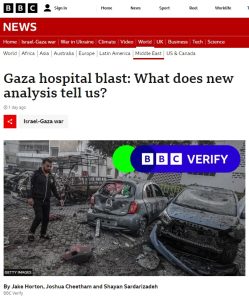
“The Forensic Architecture agency, a UK-based organisation which investigates human rights abuses, has carried out its own analysis of the crater, and suggests it is more consistent with the impact marks from an artillery shell which it concludes came from the direction of Israel.
It says that the scarring patterns above the crater are consistent with the shrapnel damage that would be expected from an artillery strike.”
Nineteen days after the publication of BBC Verify’s report, Forensic Architecture admitted that an image it had used to support its claims concerning “an artillery shell” actually showed rocket impact.
On January 9th CAMERA UK submitted a complaint to the BBC citing that new information and asking why the BBC Verify report had not been amended to reflect it. While we never received a response to our complaint, on January 10th the BBC added a footnote to that report.

As readers may recall, in late November the BBC’s international editor, Jeremy Bowen, was provided with a platform from which to defend his inaccurate reporting on the al Ahli incident: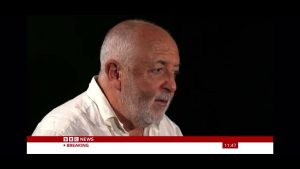
BBC RESPONSES TO CRITICISM OF COVERAGE OF THE AL AHLI EXPLOSION – PART ONE
Also in late November, BBC London continued to promote the notion of ‘conflicting claims’:
BBC LONDON PROMOTES ACTIVIST DOCTOR AND MORE AL AHLI MUDDYING
Fast forward to April 2024 and the publication of an interrogation of one of the hundreds of members of terrorist organisations apprehended at Shifa hospital during the recent IDF operation.
As reported by the Times of Israel and other local news outlets:
“The IDF releases footage from the interrogation of the spokesman for the political wing of the Palestinian Islamic Jihad in Gaza, in which he admits that the terror group tried to hide the fact that one of its rockets struck Al-Ahli Arab Hospital at the beginning of the war, as well as saying that terror operatives use “all hospitals in the Gaza Strip.”
Tarek Abu Shaluf [Abu Shlouf – ed] was among 500 terror operatives captured by the IDF at Gaza City’s Shifa Hospital last month, the military says. […]
In the video, Abu Shaluf tells an interrogator of the Military Intelligence Directorate’s Unit 504 that the blast at Al-Ahli hospital (which he refers to by the local name of “Mamadani Hospital”) was “a local rocket. We said it was Israeli.”
Israel accused Islamic Jihad of firing the rocket which fell short and hit the hospital in late October, reportedly killing dozens of people, hours after Hamas officials falsely blamed an Israeli strike, a claim that was widely reported by international media outlets.
“To erase this story, the movement (Islamic Jihad) made some moves, it made up a story that the rocket belonged to the occupation (Israel) and that the target was the [hospital] building,” Abu Shalaf says.”
Clearly the BBC now has a lot of work to do in order to amend all those reports promoting the notion of “competing claims and counterclaims” and alleging that the cause of the explosion is “still contested”. It should also of course readdress the complaints it previously dismissed and ensure the removal of Tweets referring to an “Israeli air strike” from its official accounts and those of individual journalists.
However, the relevance of this video is not only in relation to the October 17th incident at al Ahli hospital. In that interview – available with Hebrew subtitles here and with English subtitles here (part one) and here (part two) – the PIJ spokesman also explains the broader relationship between the international media and his terrorist organisation and presumably others.
Abu Shlouf: “The international media differs from the Arab ones, they focus on humanitarian issues, we don’t speak to them in the language of violence, destruction and revenge. They come and say “let’s talk for a minute or two but only talk about the humanitarian side”, meaning for instance, you’d say “it’s our right to live”, “we want the situation to return to normal and our children to live like other children in the world”. “We have the right to receive capabilities and institutions”. This is the humanitarian side. […]
Some of the international media organisations automatically address events like al Ahli. When an event happens, they talk to us. […] They like to do interviews with figures from the political bureau, senior figures like Khaled al-Batsh. There were a few international media outlets that conducted interviews with him. […]
Only three things interest him [the journalist]; was the fallen rocket yours? Khaled al-Batch of course answers him “no, it’s from the occupation”. Of course the journalist knows that the rocket is indeed ours and not yours [Israel’s].”
Interrogator: “Even though the journalist knows, does he still echo what is said by the organisation [PIJ]?”
Abu Shlouf: “Yes, because they ask him to review the article before publication, telling him to send it to us before he can publish it so we can review it.”
Interrogator: “And if it’s not to your liking, it doesn’t get published?”
Abu Shlouf: “No, of course not, because he [the journalist] needs us for more interviews.”
While the BBC is far from the only international media organisation to uncritically parrot the talking points of designated terrorist organisations, it is surely high time for some serious introspection on the part of BBC journalists on the issue of professional integrity and political agendas – including of course those at BBC Verify who promoted the selected ‘assessments’ of politically motivated actors in order to back up the false claims made by terrorist organisations.
If such introspection does not take place, the consequences for the BBC as a ‘trustworthy’ media brand will be grave.

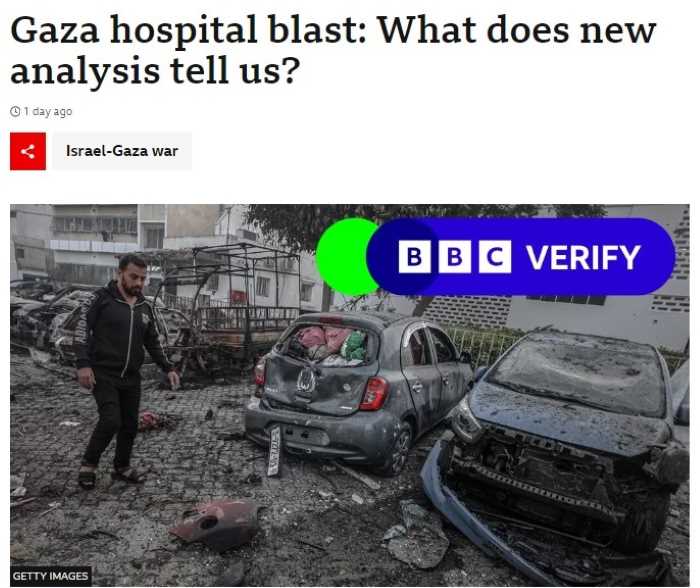


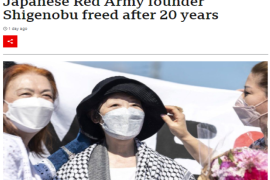

Indeed – there needs legal action against the BBC for deliberately disseminating anti Israel material and failure to correct it, even when evidence is available.
HM Government should take a firm stand against this media outlet that has resulted in demonstrations on the streets of the UK and has cost the tax payer over 30million GBP